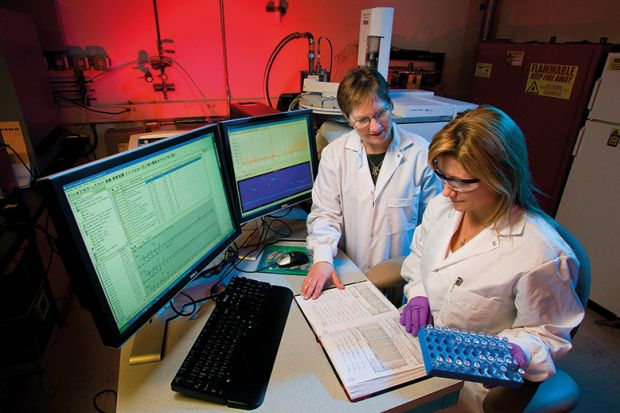Female chemistry PhD students are 50 per cent more likely to gain a permanent job in academia if their supervisor is a woman, a new study indicates.
Research that tracked the career destinations of almost 20,000 doctoral students in the US found that both men and women had extremely slim chances of obtaining a faculty post – just 4 per cent of either gender held a job at a US PhD-granting chemistry department a decade or more after graduation – but the odds significantly improved for women if they were paired with a female supervisor.
The study, published in Research Policy, also reports that female PhD students were more productive during their doctoral studies if their supervisor was a woman – with these doctoral candidates 10 to 20 per cent more likely to publish as a first author in a high-impact journal.
This improved productivity may be explained by the fact that female PhD students work better with a supervisor of the same gender given the “closer nature of the student-adviser collaboration in chemistry” compared with other subjects, says the study, written by Patrick Gaule, senior lecturer in economics at the University of Bath, and Mario Piacentini, from the Paris-based Organisation for Economic Cooperation and Development.
“Chemistry students typically work on research questions and projects suggested by advisers [and] work with equipment provided by the adviser,” the authors state, adding that a “student and his/her adviser can be thought of as jointly producing knowledge”.
Having a female supervisor may also provide a role model to show women that “it is possible to successfully combine full-time careers with satisfying personal and family lives” – with greater “professional confidence” leading to “stronger preferences for continuing in academic science”.
Alternatively, the link between better career prospects, improved productivity and the gender of PhD supervisors may be attributed to choices of doctoral candidates – with stronger female PhD students having the option to choose a female supervisor, they suggest.
However, the low proportion of female science faculty in US meant this positive effect of all-female student-supervisor pairings was often difficult to achieve, reports the study.
Only about 30 per cent of students and 12 per cent of supervisors in the sample, who graduated between 1999 and 2008, were female, while only 14 per cent of female chemistry PhDs had an adviser of the same gender.
While the “vast majority of male students have an adviser of the same gender, only a small minority of female students are in this position”, says the report, which says that 91 per cent of male chemistry PhDs were taught by a man.
As a result, the “under-representation of women in science and engineering faculty positions may perpetuate itself through the lower availability of same-gender advisers for female students”, the paper concludes.
“Hiring more women faculty members may not just have a direct effect on faculty gender ratio, but also indirectly raise future female representation through influencing the career choices of female students.”
Register to continue
Why register?
- Registration is free and only takes a moment
- Once registered, you can read 3 articles a month
- Sign up for our newsletter
Subscribe
Or subscribe for unlimited access to:
- Unlimited access to news, views, insights & reviews
- Digital editions
- Digital access to THE’s university and college rankings analysis
Already registered or a current subscriber? Login








